Background:
Ama, a remote island in Shimane prefecture, was facing a problem of depopulation, and experiencing a “crisis” due to the risk of closure of Okidozen High School, the only one high school in the island. Therefore, a project to increase the attractiveness of the school was put in place, with the aim of raising the flag of attractiveness rather than just focusing on the survival of the school. As a result, new students started to come from all over JAPAN. The reason for its success was the prioritization of the ideas and perspectives to make the school attractive. This school centered community revitalization approach is now spreading nationwide including the Shimane Prefecture.
The Kingdom of Bhutan, the counterpart country of this project, which has a national policy of maintaining and utilizing traditional culture and regional revitalization aiming for Gross National Happiness (GNH) was also experiencing a similar problem due to the outflow of the youth from rural areas to urban areas.
The purpose of the project:
This project was established to encourage schools and communities to foster “people who are responsible for future of community” by efforts such as project-based learning (hereinafter PBL), community club activities and 21st century style Terakoya (learning center). At the same time, the project aimed to contribute to the creation of sustainable communities by creating a new flow of people from urban areas to rural communities in Bhutan.
Activities and outcomes:
The project mainly implemented PBL in Bhutan.
In the first year (fiscal year 2018), we visited Bhutan several times to discuss with Ministry of Education, Ministry of Works and Human Settlement and Gross National Happiness (GNH) commission, etc. to survey for potential candidate pilot sites and to reach a general agreement with them on initiation of the project. In addition, we held a workshop with local teachers and students to develop the model of PBL program. We also promoted student exchange between Bhutan and Okidozen High school and mutual exploratory learning.
In the second year (fiscal year 2019), we held PBL workshops for 3 nights and 4 days for 19 students from 3 schools in Chhukha and 4 students from Okidozen High school. Under the mission statement of “creating a PR video clip that encourages Japanese tourists to come to Chhukha”, the students planed and conducted fieldworks to find what characteristics of the area might appear attractive, developed the video clip and presented it to the local travel agency. By not only aiming to solve local problems, but also by discovering the attractiveness of the region and creating value, the students’ motivation and independence were raised, and their sense of affirmation towards their region also increased.
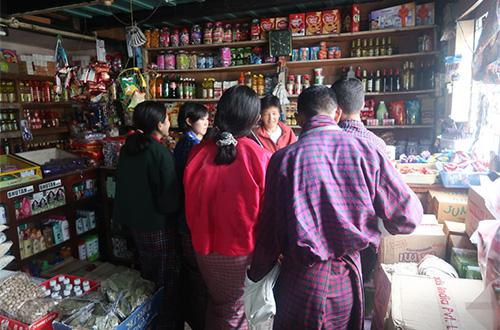 Fieldwork interview Fieldwork interview |
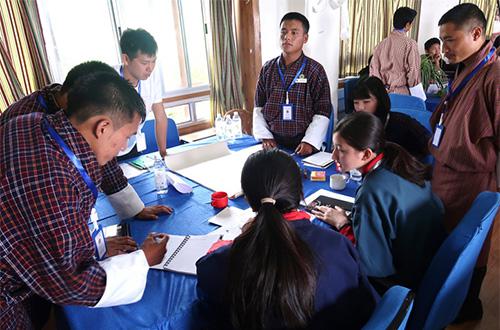 The mixed team of Bhutanese and Japanese students The mixed team of Bhutanese and Japanese studentsdiscuss together |
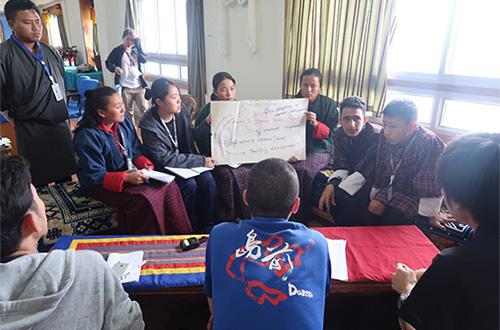 Mid-term presentation and feedback session Mid-term presentation and feedback session |
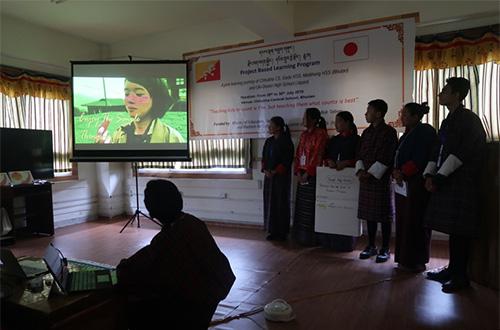 Final presentation Final presentation |
Please see the video below for the PBL workshop.
(English) :https://www.youtube.com/watch?v=A_87_5arfGI
Prior to the workshops, teachers were trained to be able to facilitate PBL workshops and to provide feedback. Bhutanese teachers were not used to observe students’ interaction and make students think by themselves, so they had initially some confusion, but after noticing how the students grew over 4 days they realized about the effectiveness of the new method and increased their trust on student´s potentials.
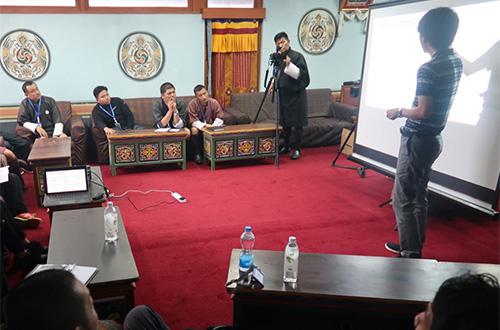 Facilitation training for teachers Facilitation training for teachers |
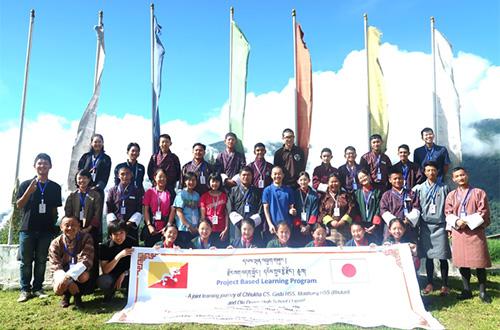 Group photo of PBL program participants Group photo of PBL program participants |
In addition, about 20 trainees from Bhutan (government officers, teachers, area coordinators etc.) were invited to Ama, where they observed PBL in Okidozen High School etc.
The “attractive school project” has built its originality by taking advantage of the disadvantageous situations, such as depopulation, regional decline, and financial difficulties, and by positively utilizing them as educational resources. The Kingdom of Bhutan is also an area that experiences similar challenges, so we experienced a high affinity.
Prospects for the future:
From this year onward, we have reached a basic agreement in the direction of further developing a program for continuous “PBL for GNH”, it means PBL toward the realization of GNH. We aim to enable sustainable efforts in Bhutan by training and developing local coordinators and teachers and developing the tools necessary for their implementation.
On the other hand, we consider Japan has a lot to learn from education for GNH in Bhutan. Based on the results of the project, we would like to promote the development of PBL for GNH so that it can be re-imported to Japan.







